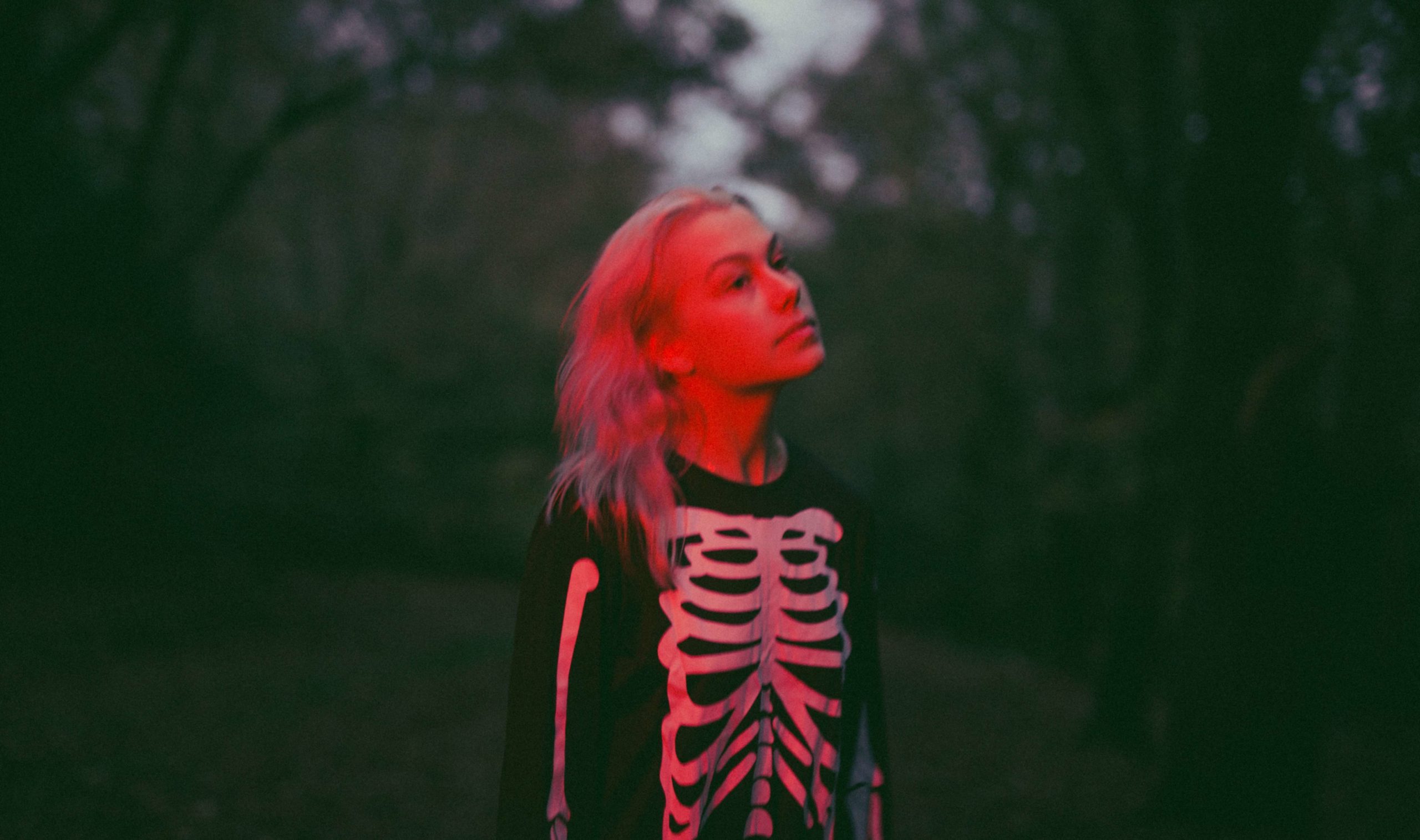On the second verse of Punisher’s title track, Phoebe Bridgers confesses, “I swear I’m not angry, that’s just my face.” “I actually have personal friends who are afraid of me,” says Bridgers when I ask her about this line. “Sometimes I’ll see people I actually know in real life, say, at the grocery store, but am not prepared to see them, and they’ll be waving at me and it’ll take me a second and I’ll just go dead-eyes on them and they’ll think I’m upset. It’s a real issue.”
Whatever perceived indifference or irritation that frequently tends to manifest on Bridger’s face, the expression never comes across during our video chat. Bridgers is instead affably wry and unfiltered, the kind of person you would want to have a no-bullshit exchange with during a global pandemic. Like most Americans during this time of social distancing, Bridgers is spending her days at home in self-quarantine. “I bought a treadmill,” she says, sitting on the outdoor deck of her LA apartment. “But I also woke up and had a chocolate chip cookie for breakfast because I made them last night. I feel like that’s kind of quintessential bachelor shit: working out and just eating like a fucking freshman in college.”
As someone who’s admitted to being in a perpetual state of anxiety, vacillating from either being too busy or bored, Bridgers says this altered state of normalcy has been psychologically taxing. Thankfully, the release of Punisher, her highly anticipated sophomore solo album, has given her something to focus on. Unlike a handful of artists whose record releases were delayed due to the pandemic, Bridgers has leaned into the album’s impending arrival, delivering a live stream mini-tour from different rooms of her house following a well-received Kimmel! performance of her lead single “Kyoto” from inside her bathtub. Postponing Punisher was never a consideration for Bridgers, who says she would otherwise “gaslight myself into thinking I’ve never accomplished anything in my life.”
For all the relative eagerness and impatience Bridgers has bottled inside for the delivery of her new record, the patience she maintained when it came to actually writing and recording it is a telling study in contrast. Written over the course of several years in hotel rooms, during soundchecks, and in her home, Punisher is a product of the songwriter’s meticulousness. “It does feel deliberate,” she says of the record’s slow production process. “I don’t know why I don’t like something when I write it, but I know that I can do better. I know when I like something, and that feeling is kind of rare. Sometimes I’ll write a draft version of a song and I’ll really—just for convenience’s sake—want it to be the version. But then I’ll write it two more times and it kind of solidifies.”
“That’s my favorite part about working with Phoebe. She doesn’t rush. She’s totally game and brave enough to scrap something no matter how much work we’ve put in. She’s super malleable and she only cares about [the song] being the best version of itself.” — Ethan Gruska
Bridgers’ patience has its way of paying off. She confesses that had she released her debut album Stranger in the Alps when her gut told her to keep working, it wouldn’t have ended up including her three favorite songs off the record: “Motion Sickness,” “Smoke Signals,” and “Scott Street.” She says a similar “brain trick” occurred when making Punisher, where once more her favorite tracks emerged with just a little more time.
Songwriter Ethan Gruska, who co-produced Stranger in the Alps and Punisher alongside industry veteran Tony Berg, tells me, “That’s my favorite part about working with Phoebe. She doesn’t rush. She’s totally game and brave enough to scrap something no matter how much work we’ve put in. She’s super malleable and she only cares about [the song] being the best version of itself. Sometimes I think when you’re in the production role you’re always having to battle against somebody who just wants to get their project done and Phoebe—I think, really, as a producer—understands the process and that it’s a winding, winding road, and you don’t get there until you get there. It’s an extreme comfort, and it just makes it so all the ideas can be really fleshed out. She’s really a beautiful collaborator.”
Bridgers’ strength as a collaborator had its own unique set of consequences in extending the writing and recording of Punisher. Before Stranger in the Alps was barely a year old, Bridgers joined fellow breakthrough artists and songwriters Julien Baker and Lucy Dacus to form boygenius, whose self-titled EP was overwhelmingly praised by critics. Then, just as the dust was beginning to settle on the surprise of the trio’s successful supergroup, Bridgers returned just a few months later with another collaborative band alongside Conor Oberst, calling themselves and their self-titled debut album Better Oblivion Community Center.

photo by Frank Ockenfels
While Baker and Dacus became the surrogate sisters Bridgers never knew she needed—experiencing many of the same early professional highs and lows in tandem—Oberst served as the cool older brother dispensing just the right amount of enthusiasm and pragmaticism to give Bridgers a better sense of the path she herself could experience navigating a long-term career. Looking back on those projects Bridgers says both simply made her more comfortable making and releasing material. And again, she says it gave her more time to write a better album.
All three artists—Baker, Dacus, and Oberst—are featured on Punisher, delivering backing vocals on select songs. “I feel like her power has only increased over time,” says Dacus. “She’s always been clever and funny and dark. But I feel like she presses into all of those traits on this record, even to the point where I was like, ‘I would never say that.’ But Phoebe would. Even some of the sonic decisions are a little tongue in cheek. Like on ‘ICU,’ she has the line ‘I used to light you up / Now I can’t even get you to play the drums,’ and the drums drop out of the mix. She’s able to be very dramatic without being corny. And I think that is, like, a really delicate line to walk on.” Dacus says that Bridgers is one of her favorite writers, that she has an incredible economy with the words she uses. “In two lines, she’s able to express [something] that I would have to write an entire song to say. But she can give you one example and you understand it.”
“Her power has only increased over time. She’s always been clever and funny and dark. But I feel like she presses into all of those traits on this record, even to the point where I was like, ‘I would never say that.’ But Phoebe would.” — Lucy Dacus
Such an example of Bridgers’ ability is on full display on Punisher’s “Chinese Satellite,” where in the opening verse she sings, “I’ve been running around in circles / Pretending to be myself / Why would somebody do this on purpose? / When they can do something else.” “I wrote ‘Chinese Satellite’ because I tried to jog and I hated it,” Bridgers explains. “And then I went home and wrote a song about how much I hate jogging—and wanting to believe in God. My metaphors are non-metaphors. My favorite metaphors are just talking about something super specific that sounds like it probably means something else, but doesn’t.”
Punisher continues Bridgers’ frequent self-evaluation of love and relationships. The intimacy of her lyrics on both this and her debut often reflect her greatest fear when it comes to getting close to someone. “[It’s] not being in control,” she confesses. “I’ve written about it a ton. You can’t fucking control people, and you also kind of can’t control yourself in those environments. I’ve had a lot of crushes where I was spending all night googling somebody or stalking them and you just feel like a weird, older version of yourself. Every time that happens to me, I’m just like, ‘How?’ That’s kind of the obsessive part of it.”
Though she never fully figures out an album’s meaning until the end of its release cycle, at the moment Bridgers says she looks at Punisher as a treatise on having a personal life during the apocalypse. “I think I’ve just been reading a lot of science fiction,” she says. “But the fact that I’m still absorbed by crushes and working out my own childhood traumas—all while the world is being run into the fucking ground—it’s just a weird thing to be focused on. But I can’t help it.”
As the world continues to produce a constant stream of frustration, anxiety, and fear, Bridgers is attempting to channel the patience that allowed her to produce her stunning new work. Biding her time, she’s even been brainstorming a new song about postponing opportunities that have always been immediately available. “It’s crazy to me how I’ll drive by things in LA and I’m like, ‘Oh, I should do that someday.’ And three years pass, and I’m like, ‘I should do that someday,’” she says. “It’s a weird feeling where you just don’t really feel like you live in your town. You just get into these habits. I live close to the beach, and I’ve been maybe twice in the past five years of my life.”
“I think I’ve just been reading a lot of science fiction. But the fact that I’m still absorbed by crushes and working out my own childhood traumas—all while the world is being run into the fucking ground—it’s just a weird thing to be focused on. But I can’t help it.” — Phoebe Bridgers
Ultimately, like so many of us, Bridgers wants to be out of her apartment. At one point in our conversation she presses her phone to her own computer screen, showing a Google map of the United States filled with pins, places she’s been, places she’s desperate to revisit, places she wants to explore further.
“I actually tweeted about this the other day. I made a joke that I could really go for a crowded venue of my least favorite people and a panic attack in the bathroom right now,” she says. “Honestly I miss shit that I hate. I miss an eight-hour band trip where you’re trying to bring up to the tour manager that you really need to take a shit, where you’re way too caffeinated and the only thing you eat for three days is peanuts because you’re in Germany and it’s either that or sausage and mayonnaise. I miss stuff I fucking hate about tour.”
Until she’s given the all-clear to start performing in actual venues again, Bridgers just hopes audiences enjoy the record in the meantime, and spend as much time with it as she did making it. “I hope people hear shit that they have felt and thought about that they’ve never heard before,” she says. “That’s my favorite thing about music. Like hearing Fiona Apple sing, ‘I resent you for being raised right / I resent you for being tall.’ That’s cool as shit. I’d love some moments like that for people.” FL







